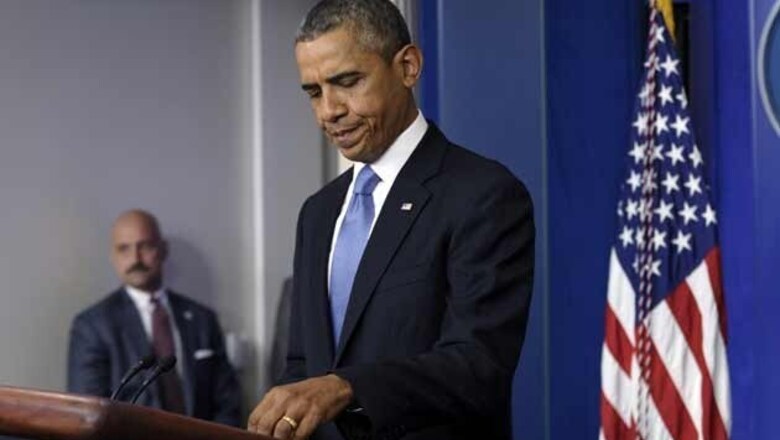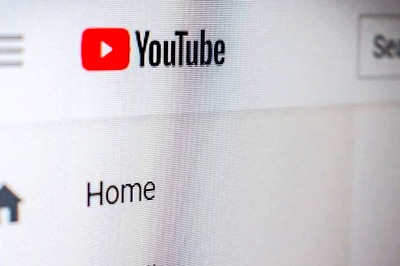
views
Washington: For the first time in 17 years, the federal government staggered into a partial shutdown on Monday at midnight after congressional Republicans stubbornly demanded changes in the nation's health care law as the price for essential federal funding and President Barack Obama and Democrats adamantly refused.
As Congress gridlocked, Obama said a "shutdown will have a very real economic impact on real people, right away," with hundreds of thousands of federal workers furloughed and veterans' centers, national parks, most of the space agency and other government operations shuttered.
He laid the blame at the feet of House Republicans, whom he accused of seeking to tie government funding to ideological demands, "all to save face after making some impossible promises to the extreme right wing of their party."
House Speaker John Boehner, R-Ohio, responded a short while later on the House floor. "The American people don't want a shutdown and neither do I," he said. Yet, he added, the new health care law "is having a devastating impact. ... Something has to be done."
The stock market dropped on fears that political deadlock between the White House and a tea party-heavy Republican Party would prevail, though analysts suggested significant damage to the national economy was unlikely unless a shutdown lasted more than a few days.
A few minutes before midnight, Budget Director Sylvia Burwell issued a directive to federal agencies to "execute plans for an orderly shutdown." While an estimated 800,000 federal workers faced furloughs, some critical parts of the government - from the military to air traffic controllers - would remain open.
Any interruption in federal funding would send divided government into territory unexplored in nearly two decades. Then, Republicans suffered grievous political damage and President Bill Clinton benefitted from twin shutdowns. Now, some Republicans said they feared a similar outcome.
If nothing else, some Republicans also conceded it was impossible to use funding legislation to squeeze concessions from the White House on health care. "We can't win," said Sen. John McCain, R-Ariz.
"We're on the brink," Sen. Barbara Mikulski, Md., said shortly after midday as the two houses maneuvered for political advantage and the Obama administration's budget office prepared for a partial shutdown, the first since the winter of 1995-1996.
On a long day and night in the Capitol, the Senate torpedoed one GOP attempt to tie government financing to changes in "Obamacare." House Republicans countered with a second despite unmistakable signs their unity was fraying - and Senate Democrats promptly rejected it, as well.
Defiant still, House Republicans decided to re-pass their earlier measure and simultaneously request negotiations with the Senate on a compromise. Some aides conceded the move was largely designed to make sure that the formal paperwork was on the Senate's doorstep as the day ended.
Whatever its intent, Senate Majority Leader Harry Reid, D-Nev., rejected it. "That closes government. They want to close government," he said of House Republicans.
As lawmakers squabbled, Obama spoke bluntly about House Republicans. "You don't get to extract a ransom for doing your job, for doing what you're supposed to be doing anyway, or just because there's a law there that you don't like," he said. Speaking of the health care law that undergoes a major expansion on Tuesday, he said emphatically, "That funding is already in place. You can't shut it down."
Some Republicans balked, moderates and conservatives alike.
Rep. Phil Gingrey of Georgia said it felt as if Republicans were retreating, given their diminishing demands, and Rep. Scott Rigell of Virginia said there was not unanimity when the rank and file met to discuss a next move.
Yet for the first time since the showdown began more than a week ago, there was also public dissent from the Republican strategy that has been carried out at the insistence of lawmakers working in tandem with GOP Sen. Ted Cruz of Texas.
Rep. Charles Dent, R-Pa., said he was willing to vote for stand-alone legislation that would keep the government running and contained no health care-related provisions. "I would be supportive of it, and I believe the votes are there in the House to pass it at that point," the fifth-term congressman said.
Other Republicans sought to blame Democrats for any shutdown, but Dent conceded that Republicans would bear the blame, whether or not they deserved it.
Hours before the possible shutdown, the Senate voted 54-46 to reject the House-passed measure that would have kept the government open but would have delayed implementation of the health care law for a year and permanently repealed a medical device tax that helps finance it.
In response, House Republicans sought different concessions in exchange for allowing the government to remain open. They called for a one-year delay in a requirement in the health care law for individuals to purchase coverage. The same measure also would require members of Congress and their aides as well as the president, vice president and the administration's political appointees to bear the full cost of their own coverage by barring the government from making the customary employer contribution.
"This is a matter of funding the government and providing fairness to the American people," said Boehner. "Why wouldn't members of Congress vote for it?"
The vote was 228-201, with a dozen Republicans opposed and nine Democrats in favor.
Unimpressed, Senate Democrats swatted it on a 54-46 party line vote about an hour later.
Obama followed up his public remarks with phone calls to Boehner and the three other top leaders of Congress, telling Republicans he would continue to oppose attempts to delay or cut federal financing of the health care law.
The impact of a shutdown would be felt unevenly.
Many low-to-moderate-income borrowers and first-time homebuyers seeking government-backed mortgages could face delays, and Obama said veterans' centers would be closed.
About 800,000 federal workers, many already reeling from the effect of automatic budget cuts, would be ordered to report to work Tuesday for about four hours - but only to carry out shutdown-related chores such as changing office voicemail messages and completing time cards.
Some critical services such as patrolling the borders and inspecting meat would continue. Social Security benefits would be sent, and the Medicare and Medicaid health care programs for the elderly and poor would continue to pay doctors and hospitals.
US troops were shielded from any damage to their wallets when Obama signed legislation assuring the military would be paid in the event of a shutdown.
That had no impact on those who labor at other agencies.
"I know some other employees, if you don't have money saved, it's going to be difficult," said Thelma Manley, who has spent seven years as a staff assistant with the Internal Revenue Service during a 30-year career in government.
As for herself, she said, "I'm a Christian, I trust in God wholeheartedly and my needs will be met." She added, "I do have savings, so I can go to the reserve, so to speak."



















Comments
0 comment